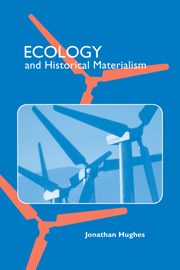Book contents
- Frontmatter
- Contents
- Acknowledgements
- Introduction
- 1 Ecological problems: definition and evaluation
- 2 Marxism and the green Malthusians
- 3 Marxism and the ecological method
- 4 Historical materialism: locating society in nature
- 5 Development of the productive forces
- 6 Capitalism, socialism and the satisfaction of needs
- Conclusion
- References
- Index
4 - Historical materialism: locating society in nature
Published online by Cambridge University Press: 22 September 2009
- Frontmatter
- Contents
- Acknowledgements
- Introduction
- 1 Ecological problems: definition and evaluation
- 2 Marxism and the green Malthusians
- 3 Marxism and the ecological method
- 4 Historical materialism: locating society in nature
- 5 Development of the productive forces
- 6 Capitalism, socialism and the satisfaction of needs
- Conclusion
- References
- Index
Summary
In chapter 2, I rejected the Malthusian notion of nature as an absolute constraint on social development, on the grounds that nature's impact is always mediated by social and technological factors. However, the fact that nature has an impact, and that the scope for mediation of that impact is limited, cannot be denied. We have seen that Marx and Engels recognise these facts in various of their statements, including their criticisms of Malthus. It may be argued, however, that this is mere lip-service; what is needed is not simply that these facts be recognised, but that they be properly theorised and incorporated into a political programme. My view is that Marxism has the resources for such a theorisation, and in this chapter I take a further step in arguing for this view, by showing how the idea of human dependence upon nature forms an integral and central component of Marx's theory of society.
Ecology and human dependence upon nature
Let me begin by stating the obvious: the relation between human beings and non-human nature is a two-way affair. Humans are affected by non-human nature and in turn affect it. Indeed, the two elements of this relation, and their interplay, are essential to our understanding of environmental problems. If humans were not affected by nature, then the disruption of natural systems, whether by human action or by natural processes, would not produce environmental problems, at least as they are usually understood and as they were defined in chapter 1.
- Type
- Chapter
- Information
- Ecology and Historical Materialism , pp. 86 - 120Publisher: Cambridge University PressPrint publication year: 2000
- 1
- Cited by



